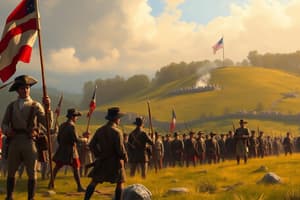Podcast
Questions and Answers
Which of the following best describes the organization of the American rebels during the Revolutionary War?
Which of the following best describes the organization of the American rebels during the Revolutionary War?
- Highly organized and unified
- Poorly organized with little unity (correct)
- Disorganized and chaotic
- Moderately organized with some unity
What document did the disorganized colonists adopt in 1781?
What document did the disorganized colonists adopt in 1781?
- Declaration of Independence
- Articles of Confederation (correct)
- United States Constitution
- Bill of Rights
What economic difficulties did the American rebels face during the Revolutionary War?
What economic difficulties did the American rebels face during the Revolutionary War?
- Lack of metallic money (correct)
- Excessive government regulation
- High taxes
- Inflation
Which British minister was responsible for passing the Townshend Acts in 1767?
Which British minister was responsible for passing the Townshend Acts in 1767?
What was the main distinction between the Stamp Act and the Townshend Acts?
What was the main distinction between the Stamp Act and the Townshend Acts?
Why did the colonists find the tax on tea particularly irksome?
Why did the colonists find the tax on tea particularly irksome?
Who expressed his distrust of militia, stating that depending on them was like resting on a broken staff?
Who expressed his distrust of militia, stating that depending on them was like resting on a broken staff?
Who withdrew his son from the army rather than see him fight against the American colonists?
Who withdrew his son from the army rather than see him fight against the American colonists?
Who openly cheered American victories and believed that the battle for British freedom was being fought in America?
Who openly cheered American victories and believed that the battle for British freedom was being fought in America?
Who calculated that during the prolonged campaign, about 60,000 American babies were born while the redcoats captured Bunker Hill?
Who calculated that during the prolonged campaign, about 60,000 American babies were born while the redcoats captured Bunker Hill?
According to the text, which British political theorist supported the American cause?
According to the text, which British political theorist supported the American cause?
What did the British government pass in response to the Boston Tea Party?
What did the British government pass in response to the Boston Tea Party?
Which act was seen as especially noxious by the American colonists?
Which act was seen as especially noxious by the American colonists?
What did the American colonists do in response to the Intolerable Acts?
What did the American colonists do in response to the Intolerable Acts?
Which event directly led to the formation of the first American congresses?
Which event directly led to the formation of the first American congresses?
What was the motivation behind the British government's decision to award the British East India Company a complete monopoly of the American tea business?
What was the motivation behind the British government's decision to award the British East India Company a complete monopoly of the American tea business?
Why did many American tea drinkers oppose the British move to sell tea at lower prices?
Why did many American tea drinkers oppose the British move to sell tea at lower prices?
What was the reaction of the colonists to the enforcement of the tea tax law by the British colonial authorities?
What was the reaction of the colonists to the enforcement of the tea tax law by the British colonial authorities?
During the First Continental Congress, which of the following best describes the purpose of the Congress?
During the First Continental Congress, which of the following best describes the purpose of the Congress?
What was the most significant action taken by the First Continental Congress?
What was the most significant action taken by the First Continental Congress?
What event marked the beginning of the Revolutionary War?
What event marked the beginning of the Revolutionary War?
What was the population ratio between the British and the colonists during the Revolutionary War?
What was the population ratio between the British and the colonists during the Revolutionary War?
Which act led to the suspension of the legislature of New York in 1767?
Which act led to the suspension of the legislature of New York in 1767?
Which tax was retained by the British government to keep alive the principle of parliamentary taxation?
Which tax was retained by the British government to keep alive the principle of parliamentary taxation?
Who organized the local committees of correspondence in Massachusetts during 1772?
Who organized the local committees of correspondence in Massachusetts during 1772?
What was the chief function of the local committees of correspondence in Massachusetts?
What was the chief function of the local committees of correspondence in Massachusetts?
Flashcards are hidden until you start studying
Study Notes
Organization of American Rebels
- American rebels were initially disorganized but gradually formed structured militias and committees.
- The Articles of Confederation was adopted in 1781 as the first governing document of the United States.
Economic Difficulties
- American rebels faced significant economic challenges including inflation and supply shortages during the Revolutionary War.
Townshend Acts
- The Townshend Acts of 1767 were passed by British Minister Charles Townshend.
- The Stamp Act imposed direct taxes on paper goods, while the Townshend Acts taxed imported goods, leading to different colonial reactions.
Taxation and Resistance
- The tax on tea was particularly irksome due to its symbolic value and previous resistances, including the Boston Tea Party.
- Thomas Paine expressed distrust of militia, comparing reliance on them to depending on a "broken staff."
- George Washington withdrew his son, John, from the army to prevent him from fighting against fellow colonists.
Support for American Cause
- Support for American victories came from figures like Benjamin Franklin, who viewed the conflict as a fight for British freedoms.
- During the campaign, about 60,000 American babies were born, highlighting the war's prolonged impact on society.
Theoretical Support
- British political theorist John Locke's ideas provided ideological support for the American cause.
Legislative Actions
- The British government passed the Coercive Acts (Intolerable Acts) in response to the Boston Tea Party.
- The Intolerable Acts were seen as particularly noxious due to their punitive nature against the colonists.
Colonial Response
- In response to the Intolerable Acts, American colonists formed the First Continental Congress and organized widespread protests.
- The event triggering the formation of the Congress was the punitive measures following the Boston Tea Party.
Economic Monopoly and Tax Reactions
- The British government aimed to grant the British East India Company a monopoly to boost its failing economy.
- American tea drinkers opposed the British monopoly despite lower prices, fearing loss of independence in trade.
Continental Congress Perspectives
- The purpose of the First Continental Congress was to unify colonial reaction against British policies.
- A significant action taken was the establishment of a collective resistance against British taxation.
Revolutionary War Milestones
- The Revolutionary War began with the battles of Lexington and Concord.
- The population ratio was approximately 2.5 million colonists to 1 million British subjects during the war.
Legislative Actions and Organization
- The New York legislature was suspended due to noncompliance with the Quartering Act of 1767.
- The Tea Act was retained by Britain to assert the principle of parliamentary taxation.
- Samuel Adams organized local committees of correspondence in Massachusetts, allowing for effective communication and mobilization among colonists.
- These committees facilitated coordination of resistance efforts and spread revolutionary ideas throughout the colonies.
Studying That Suits You
Use AI to generate personalized quizzes and flashcards to suit your learning preferences.




